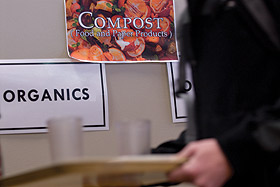News Archives - 2009
Augsburg dining goes totally trayless
 The number to remember each time you eat a meal in the Christensen Center Commons is 900.
The number to remember each time you eat a meal in the Christensen Center Commons is 900.
That's a conservative estimate of how many gallons of water will be saved each week through the full elimination of trays in Augsburg's primary dining facility.
A year ago, Augsburg instituted Trayless Tuesdays in the Commons as part of the College's largely student-led initiative to make the campus more environmentally-friendly. For the second semester, trays also weren't available on Fridays in the Commons.
As the 2009-10 academic year begins, trays will only be available for people who specifically request them. With that move, Augsburg joins a growing number of colleges and universities locally and nationally in eliminating trays from dining facilities. The University of Minnesota, Hamline and Concordia-St. Paul all fully eliminated trays before last school year.
Gilbert Villas, the Augsburg dining service director for A'viands, said that about 2,700 meals are served daily Monday through Friday in the Commons. The elimination of most trays translates to savings in water, electricity to run the dishwasher, and in detergent use.
In addition, trayless dining leads to less wasted food.
"When people get a tray, they get enough to fill the tray and try a little of everything," Villas said. "Sometimes they wouldn't eat all of it."
Going fully trayless is the latest move in a quest to make dining at Augsburg much more green.
A year ago, Augsburg partnered with Hennepin County for composting of waste from the Commons, and the results were staggering. After previously having about 340 gallons of garbage per day in the Commons, participation in composting reduced that number to 15 gallons per day.
"We took that out of the landfills," Villas said.
Composting has now spread to other dining facilities on campus, including Nabo and Coopers. In the pay-as-you-go dining facilities, all plates, glasses, and silverware are made out of sugar- or corn-based products. Those products can be composted along with food waste.
The only items that can't be composted are wrappers from some pre-packaged items such as muffins, margarine and saltine crackers.
Going green does come with a price. Villas said many of the compostable plates and glasses can cost two or three times as much as traditional plastic items. A plastic garbage bag, for example, costs A'viands 26 cents while a green compostable bag costs more than a dollar.
"We'll spend that money because it will have a big impact on the college and ourselves," Villas said.
Villas said some of the environmentally-friendly moves made at Augsburg are now being used at some of the other campuses where A'viands is the food-service provider, including Wisconsin-Green Bay, Wisconsin-Superior, Black Hills State in South Dakota, Crown College and Normandale Community College.